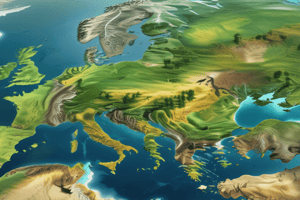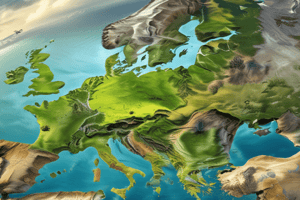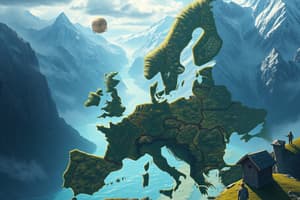Podcast
Questions and Answers
What is the main climate type of Northern Europe?
What is the main climate type of Northern Europe?
Which geographical areas might be included in the definition of Northern Europe?
Which geographical areas might be included in the definition of Northern Europe?
Which islands are considered part of Northern Europe?
Which islands are considered part of Northern Europe?
What affects the climate of the entire region?
What affects the climate of the entire region?
Signup and view all the answers
Which of the following is not considered geographically in Europe?
Which of the following is not considered geographically in Europe?
Signup and view all the answers
What type of plain lies to the east of Northern Europe?
What type of plain lies to the east of Northern Europe?
Signup and view all the answers
Which of the following organizations classifies Denmark, Finland, Iceland, Norway, Sweden as Northern European countries?
Which of the following organizations classifies Denmark, Finland, Iceland, Norway, Sweden as Northern European countries?
Signup and view all the answers
What are the most common first languages in the Faroe Islands, Iceland, Denmark, Norway, and Sweden?
What are the most common first languages in the Faroe Islands, Iceland, Denmark, Norway, and Sweden?
Signup and view all the answers
Which of the following includes Estonia, Latvia, Lithuania as Northern European countries?
Which of the following includes Estonia, Latvia, Lithuania as Northern European countries?
Signup and view all the answers
Which region of Northern Europe is known for high education quality and includes Estonia and Finland as top OECD countries in Europe?
Which region of Northern Europe is known for high education quality and includes Estonia and Finland as top OECD countries in Europe?
Signup and view all the answers
Which event led to the spread of Christianity in Northern Europe during the Middle Ages?
Which event led to the spread of Christianity in Northern Europe during the Middle Ages?
Signup and view all the answers
Which of the following languages are spoken in the Sápmi region and are listed as endangered?
Which of the following languages are spoken in the Sápmi region and are listed as endangered?
Signup and view all the answers
Which of the following regions are generally included in Northern Europe according to the CIA World Factbook?
Which of the following regions are generally included in Northern Europe according to the CIA World Factbook?
Signup and view all the answers
From which language group do the Celtic languages such as Welsh, Scots Gaelic, and Irish belong to?
From which language group do the Celtic languages such as Welsh, Scots Gaelic, and Irish belong to?
Signup and view all the answers
Which group of people were the last to be converted to Christianity in Northern Europe?
Which group of people were the last to be converted to Christianity in Northern Europe?
Signup and view all the answers
In which century were the Sámi people converted to Christianity?
In which century were the Sámi people converted to Christianity?
Signup and view all the answers
Northern Europe is strictly defined as being north of the southern coast of the Baltic Sea, which is about 54°N.
Northern Europe is strictly defined as being north of the southern coast of the Baltic Sea, which is about 54°N.
Signup and view all the answers
Greenland is geographically considered to be in Europe.
Greenland is geographically considered to be in Europe.
Signup and view all the answers
The climate in Northern Europe is not affected by the Gulf Stream.
The climate in Northern Europe is not affected by the Gulf Stream.
Signup and view all the answers
The British Isles, Fennoscandia, and the peninsula of Jutland are not part of Northern Europe.
The British Isles, Fennoscandia, and the peninsula of Jutland are not part of Northern Europe.
Signup and view all the answers
Northern Europe includes the mountainous western seaboard, Scotland, and Scandinavia.
Northern Europe includes the mountainous western seaboard, Scotland, and Scandinavia.
Signup and view all the answers
The main climate types in Northern Europe are Tropical and Arid.
The main climate types in Northern Europe are Tropical and Arid.
Signup and view all the answers
Northern Europe includes Greenland according to the United Nations geoscheme.
Northern Europe includes Greenland according to the United Nations geoscheme.
Signup and view all the answers
The CIA World Factbook classifies the British Isles as part of Northern Europe.
The CIA World Factbook classifies the British Isles as part of Northern Europe.
Signup and view all the answers
The dominant languages of Northern Europe are Romance languages.
The dominant languages of Northern Europe are Romance languages.
Signup and view all the answers
The Sámi languages are not listed as endangered.
The Sámi languages are not listed as endangered.
Signup and view all the answers
Christianity spread to Northern Europe before the Middle Ages.
Christianity spread to Northern Europe before the Middle Ages.
Signup and view all the answers
The population of Northern Europe is generally underdeveloped.
The population of Northern Europe is generally underdeveloped.
Signup and view all the answers
The Nordic countries do not have a high standard of living.
The Nordic countries do not have a high standard of living.
Signup and view all the answers
The British Isles are known for speaking Celtic languages only.
The British Isles are known for speaking Celtic languages only.
Signup and view all the answers
Northern Europe does not include the Baltic states according to EuroVoc.
Northern Europe does not include the Baltic states according to EuroVoc.
Signup and view all the answers
The Sámi people were converted to Christianity in the 15th century.
The Sámi people were converted to Christianity in the 15th century.
Signup and view all the answers
The World Geographical Scheme for Recording Plant Distributions includes Greenland as part of Northern Europe.
The World Geographical Scheme for Recording Plant Distributions includes Greenland as part of Northern Europe.
Signup and view all the answers
The United Nations geoscheme includes Estonia, Latvia, Lithuania as part of Northern Europe.
The United Nations geoscheme includes Estonia, Latvia, Lithuania as part of Northern Europe.
Signup and view all the answers
Which countries are generally understood to be part of Northern Europe according to the United Nations geoscheme?
Which countries are generally understood to be part of Northern Europe according to the United Nations geoscheme?
Signup and view all the answers
What are the dominant languages of Northern Europe, and which language group do the Celtic languages belong to?
What are the dominant languages of Northern Europe, and which language group do the Celtic languages belong to?
Signup and view all the answers
Which region of Northern Europe is known for high education quality, and which countries are among the top OECD countries in Europe according to the text?
Which region of Northern Europe is known for high education quality, and which countries are among the top OECD countries in Europe according to the text?
Signup and view all the answers
Study Notes
-
The text discusses the classification of Northern Europe and the countries included in this region.
-
Northern Europe is generally understood to include the Nordic countries, the British Isles, Baltic states, and sometimes Greenland.
-
According to the United Nations geoscheme, Northern Europe includes Denmark, Estonia, Finland, Iceland, Ireland, Latvia, Lithuania, Norway, Sweden, United Kingdom, as well as their dependencies.
-
EuroVoc, a multilingual thesaurus of the European Union, includes Estonia, Latvia, Lithuania, Denmark, Finland, Iceland, and Norway as Northern European countries.
-
The CIA World Factbook classifies Denmark, Finland, Iceland, Norway, Sweden, and their dependencies as Northern European countries.
-
According to the World Geographical Scheme for Recording Plant Distributions, Northern Europe includes Denmark, Finland, Iceland, Ireland, Norway, Sweden, United Kingdom, as well as their dependencies.
-
The population of Northern Europe is generally developed and has a high standard of living.
-
The Nordic countries are known for their high education quality, with Estonia and Finland being among the top OECD countries in Europe.
-
The dominant languages of Northern Europe are Germanic, with North Germanic being the most common first language in the Faroe Islands, Iceland, Denmark, Norway, and Sweden.
-
The Celtic languages, such as Welsh, Scots Gaelic, and Irish are spoken in the British Isles, with Cornish and Manx being revived.
-
The Sámi languages, such as North Sámi, Lule Sámi, and South Sámi are spoken in the Sápmi region and are listed as endangered.
-
Christianity spread to Northern Europe during the Middle Ages, leading to the influence of Western Christianity and Latin alphabet.
-
The last peoples to be converted to Christianity were the Sámi in the 18th century.
-
The text discusses the classification of Northern Europe and the countries included in this region.
-
Northern Europe is generally understood to include the Nordic countries, the British Isles, Baltic states, and sometimes Greenland.
-
According to the United Nations geoscheme, Northern Europe includes Denmark, Estonia, Finland, Iceland, Ireland, Latvia, Lithuania, Norway, Sweden, United Kingdom, as well as their dependencies.
-
EuroVoc, a multilingual thesaurus of the European Union, includes Estonia, Latvia, Lithuania, Denmark, Finland, Iceland, and Norway as Northern European countries.
-
The CIA World Factbook classifies Denmark, Finland, Iceland, Norway, Sweden, and their dependencies as Northern European countries.
-
According to the World Geographical Scheme for Recording Plant Distributions, Northern Europe includes Denmark, Finland, Iceland, Ireland, Norway, Sweden, United Kingdom, as well as their dependencies.
-
The population of Northern Europe is generally developed and has a high standard of living.
-
The Nordic countries are known for their high education quality, with Estonia and Finland being among the top OECD countries in Europe.
-
The dominant languages of Northern Europe are Germanic, with North Germanic being the most common first language in the Faroe Islands, Iceland, Denmark, Norway, and Sweden.
-
The Celtic languages, such as Welsh, Scots Gaelic, and Irish are spoken in the British Isles, with Cornish and Manx being revived.
-
The Sámi languages, such as North Sámi, Lule Sámi, and South Sámi are spoken in the Sápmi region and are listed as endangered.
-
Christianity spread to Northern Europe during the Middle Ages, leading to the influence of Western Christianity and Latin alphabet.
-
The last peoples to be converted to Christianity were the Sámi in the 18th century.
-
The text discusses the classification of Northern Europe and the countries included in this region.
-
Northern Europe is generally understood to include the Nordic countries, the British Isles, Baltic states, and sometimes Greenland.
-
According to the United Nations geoscheme, Northern Europe includes Denmark, Estonia, Finland, Iceland, Ireland, Latvia, Lithuania, Norway, Sweden, United Kingdom, as well as their dependencies.
-
EuroVoc, a multilingual thesaurus of the European Union, includes Estonia, Latvia, Lithuania, Denmark, Finland, Iceland, and Norway as Northern European countries.
-
The CIA World Factbook classifies Denmark, Finland, Iceland, Norway, Sweden, and their dependencies as Northern European countries.
-
According to the World Geographical Scheme for Recording Plant Distributions, Northern Europe includes Denmark, Finland, Iceland, Ireland, Norway, Sweden, United Kingdom, as well as their dependencies.
-
The population of Northern Europe is generally developed and has a high standard of living.
-
The Nordic countries are known for their high education quality, with Estonia and Finland being among the top OECD countries in Europe.
-
The dominant languages of Northern Europe are Germanic, with North Germanic being the most common first language in the Faroe Islands, Iceland, Denmark, Norway, and Sweden.
-
The Celtic languages, such as Welsh, Scots Gaelic, and Irish are spoken in the British Isles, with Cornish and Manx being revived.
-
The Sámi languages, such as North Sámi, Lule Sámi, and South Sámi are spoken in the Sápmi region and are listed as endangered.
-
Christianity spread to Northern Europe during the Middle Ages, leading to the influence of Western Christianity and Latin alphabet.
-
The last peoples to be converted to Christianity were the Sámi in the 18th century.
Studying That Suits You
Use AI to generate personalized quizzes and flashcards to suit your learning preferences.
Description
Explore the climate and geography of the northern region of Europe, including Oceanic, Humid continental, Subarctic, and Tundra climates. Understand the various definitions and geographical factors that define Northern Europe.




